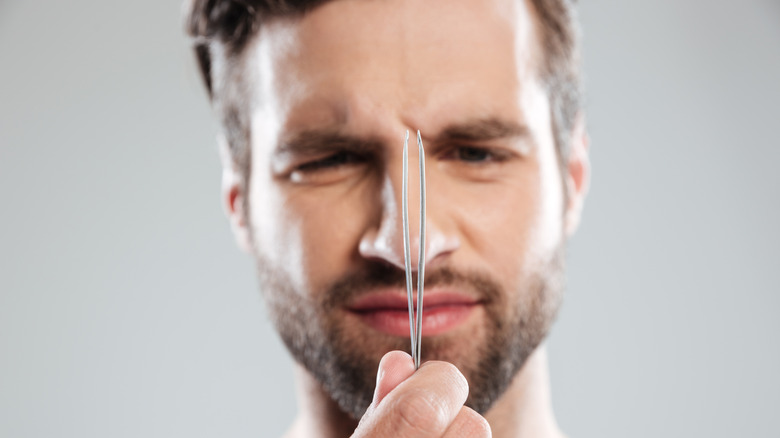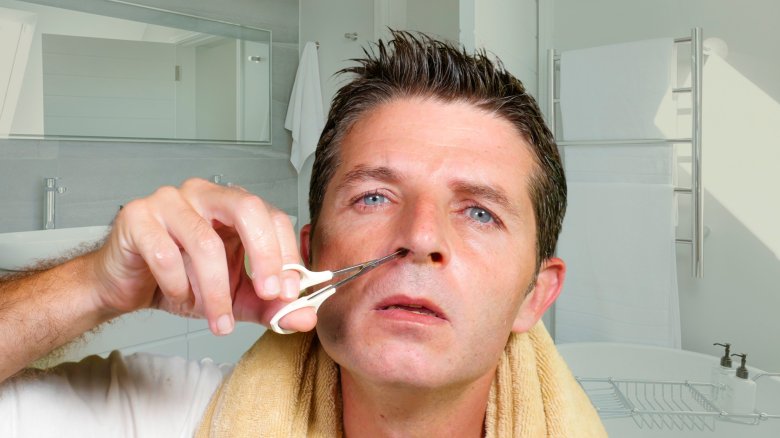The Reason You Have Nose Hair And Why You Shouldn't Pluck It
On the long list of the types of hairs that can be found on the human body, nose hair probably ranks as one of the least desirable. While many types of body hair, such as leg hair and armpit hair, are considered socially acceptable for men, but not women to have (thanks, patriarchy), prominent nose hair is something that both men and women might be tempted to remove, and we can't really blame them. Nose hair can be unsightly and can grow thicker and more prominent as people age, leaving even those who may have let nose hair grow freely in their younger years wanting to remove it. Should they, though? Nose hair actually has a pretty specific purpose, and it's something that you should let grow freely. But why?
This is about to get a little technical, so bear with us. It turns out that you actually have two kinds of nose hair. First, there are the vibrissae, aka the visible nose hairs that are oh-so-tempting to yank out of your nostrils. Then you have smaller hairs, the microscopic cilia. These hairs filter mucus through to the back of your nose where it eventually goes to your stomach.
So what's so bad about plucking nose hairs? While it may not seem like it, your nose is actually guarding passageways to other parts of your body. If you mess with that passageway, you risk putting your entire body in danger. Think of the vibrissae as the first line of defense when it comes to nose health. Those nose hairs keep germs and particles from sliding down to your stomach along with all that mucus.
Plucking your nose hairs, however, opens the door to infection, because when the hair follicles are pulled out, it leaves room for the germs to get in. Once an infection hits your nose, it could potentially be passed on to your brain since the veins that carry blood from your nose connect to the veins that carry blood from your brain.
In severe cases, this spread of infection could lead to meningitis or brain abscess. While those outcomes might seem extreme, a lack of nose hair could also lead to sinusitis and allergy attacks. This means that if you're already susceptible to respiratory problems, you have even more of a reason to let those nose hairs grow. Even if you don't get an infection, plucking those nose hairs could still lead to uncomfortable ingrown hairs and damaged mucous membranes inside the nose.
Plucking your nose hair with tweezers is bad enough, but even worse than doing that is using your fingers to get rid of unwanted nose hair. When you use your fingers to pluck your nose hairs, you aren't just opening your nose up to potential infection but introducing a whole host of germs to your nostrils. You're also more likely to break the skin of your nose this way. "A break in the skin from removing nose hairs can cause overgrowth and a local cellulitis which can spread and become sepsis," Dr. Barry Cohen told Dollar Shave Club. "Stop ripping nose hair out with your fingers!"
Assuming you've heard all this and still insist on grooming your nose hair, there are much, much safer options than digging in your nostrils with your dirty fingers or with a pair of tweezers. If you absolutely must do something about your nose hair, consider trimming it instead.
To be completely safe, you'll want to invest in the right equipment. Dr. Julie Russak, a dermatologist, told Women's Health that trimming scissors are your best bet as "trimming scissors are designed at an angle and specifically for trimming these hard to reach areas." It's best to remove your excess nose hair in a well lit area with the help of a magnifying mirror. Before starting, make sure that you've cleaned your nose and the scissors.
Electric nose trimmers are another viable option, or, for a more lasting (albeit more expensive solution) you could opt for professional laser hair removal. Just make sure that you're focusing on excess nose hair — that is, hair that is actually growing outside the nostril. If you limit your nose hair removal to just the overgrowth and make sure to leave most of the hair in place, you can keep your nose groomed and healthy.

